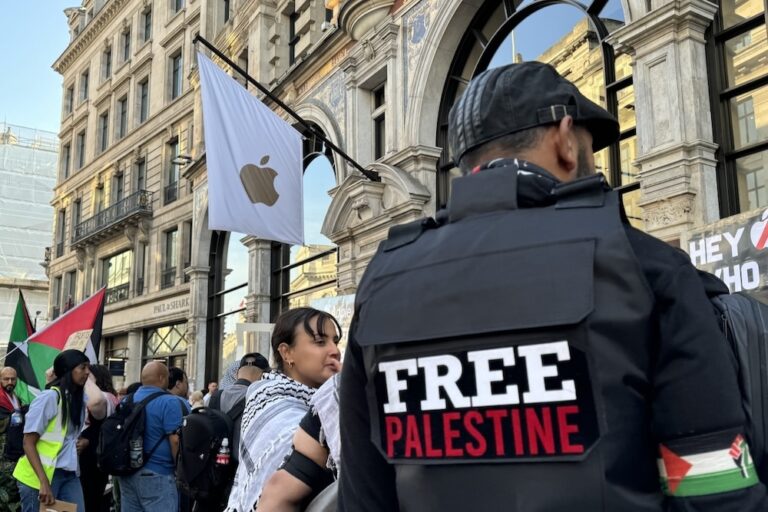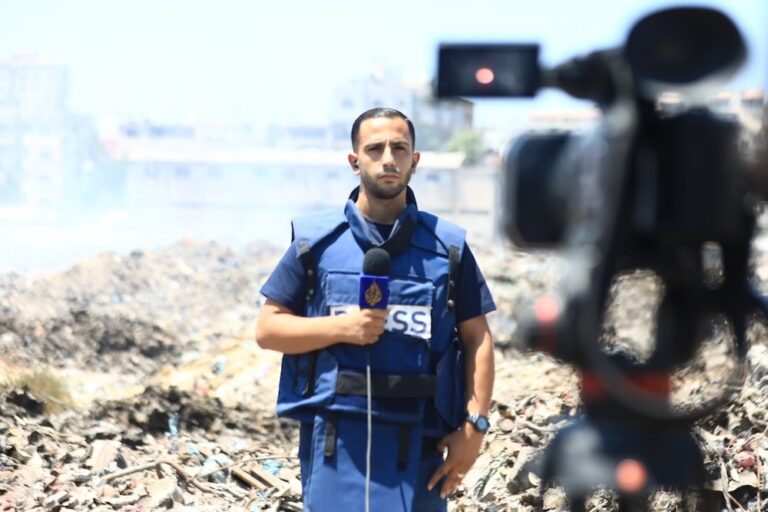MADA identified a total of 206 violations of media freedoms, with the murder of Italian journalist Vittorio Arrigoni in Gaza representing the most serious violation of the year.
(MADA/IFEX) – The Palestinian Center for Development and Media Freedoms (MADA) has released its annual media freedom violations report for the occupied Palestinian territories (oPt) in 2011. The report includes documentation of all violations committed against journalists and media freedoms monitored by MADA, in addition to analysis of the most prominent and dangerous types of violations committed in 2011.
MADA identified a total of 206 violations of media freedoms in the oPt in 2011, showing little improvement over 2010, which witnessed a total of 218 violations. Although the numbers show a decrease in the violations compared with 2010, with only twelve fewer violations this cannot be considered a qualitative improvement in media freedoms considering the seriousness and brutality of a number of the violations that occurred in 2011.
MADA general director Mousa Rimawi stated that the status of media freedom in the oPt remains tentative because of continued Israeli occupation forces (IOF) violations against journalists and media freedoms, and ongoing Palestinian security forces violations in the West Bank and Gaza Strip.
Rimawi stressed that without an end to the occupation and the ratification of the Palestinian political reconciliation it is difficult to talk about real improvements in media freedoms.
Rimawi said the number of Palestinian violations exceeded IOF violations by a small margin for the first time in 2011. Palestinian security services committed 106 violations in the West Bank and Gaza Strip, marking a significant increase over 2010, which witnessed a total of 79 Palestinian violations. There was a marked decrease in IOF and settler violations in 2011, with a total count of 100 compared with 2010, which saw a total of 139 IOF violations.
Rimawi, however, stated two important factors in this regard. Firstly, that although the total number of Israeli violations decreased, the violations committed constituted a greater threat to the health and well-being of journalists, who were targeted with, for example, the excessive and inappropriate use of crowd control weaponry such as rubber coated steel bullets, teargas, concussion grenades and the recently introduced Long Range Acoustic Device (LRAD), coined “The Scream”. Secondly, that in cases of nonviolent abuses, such as restriction of movement, prohibition from travel or prevention from covering an event, many journalists do not report the incident. In addition, it is also important to note the different Palestinian security service trends seen in the two divided Palestinian territories, with 2011 seeing 62 violations in the Gaza Strip and 44 in the West Bank.
MADA also believes that the marked increase in Palestinian security service violations is spurred on by the continuing Palestinian political divisions. Despite the signing of a reconciliation agreement between Fatah and Hamas in 2011, no real steps towards appeasement have been made and there remains a lack of accountability for perpetrators.
The most serious and heinous violation seen in 2011 was the murder of Italian journalist Vittorio Arrigoni by an armed group in Gaza. As a well known, long-term solidarity activist and advocate of the Palestinian people, Arrigoni’s murder sent shockwaves through Palestinian society. Before his death, Arrigoni had spent three years living in and reporting from the Gaza Strip, writing articles and raising awareness of the terrible conditions suffered by the people of Gaza as a result of the Israeli blockade and siege.
Arrigoni was known throughout the Palestinian territories as a kind man who loved helping anyone, anywhere he could, a dedication for which he received Palestinian citizenship in honour of all his efforts.
2011 also witnessed the severe injury of journalist Mohamed Othman, who was shot in the chest and hand by the IOF on 15 May, while covering a march commemorating the 63rd anniversary of the Nakba. The severity of Othman’s injury, which included paralysis from the waist down, necessitated his transfer to a hospital in Turkey – where he remains today – for specialist treatment. After approximately 10 months of treatment his condition has improved. Othman is now able to walk with the aid of a special device. His doctors, however, estimate that it will take a further two years for him to be able to walk unassisted.
MADA stressed in its report that Israel’s continued violation of international conventions, particularly Article 19 of the Universal Declaration of Human Rights, and its continued assault on freedom of expression in the oPt has made journalism one of the most difficult and dangerous professions practiced by Palestinians. MADA also denounced the widespread official international silence towards Israeli violations and the lack of any tangible steps taken to reduce the danger faced by journalists in the line of duty.
MADA additionally called upon the Palestinian authorities in the West Bank and Gaza Strip to respect the right to freedom of expression and abide by Palestinian Basic Law, particularly Article 19, which sanctions this right. MADA also called for an end to the Palestinian political division’s effect on the media, as well as for all media outlets to be allowed to work freely and without hindrance, and demanded that all those responsible for attacks on journalists be held accountable.


